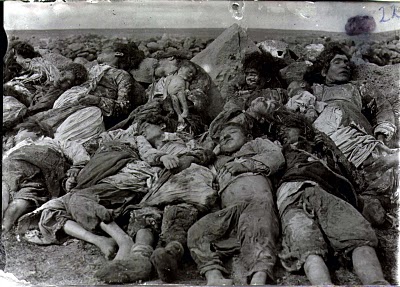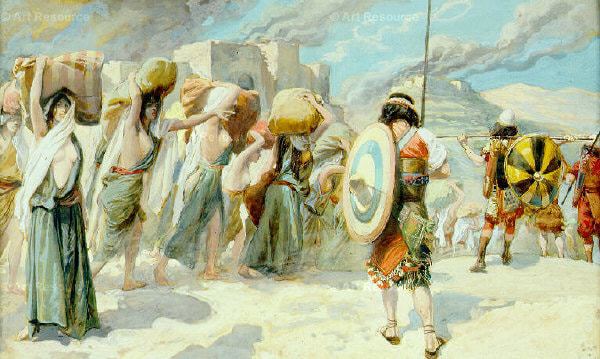 I mentioned in yesterday’s post that, if the temperature broke here in Philly, I would follow up with a post that looks at some passages that will help us feel the full weight of the issue of Canaanite genocide in the Old Testament. Well, it won’t get out of the the 80s today, so, here you go.
I mentioned in yesterday’s post that, if the temperature broke here in Philly, I would follow up with a post that looks at some passages that will help us feel the full weight of the issue of Canaanite genocide in the Old Testament. Well, it won’t get out of the the 80s today, so, here you go.
First, let me say again that I appreciate the discussion thus far, pro and con. It’s a tough issue that can certainly benefit from collective thinking.
I can’t help but remark, though, that I am a bit stunned by those who do not seem the slightest bit concerned about God ordering the Israelites to cleanse the land from Canaanite impurity.
I continue to encourage those of you still hanging with the discussion, even if you are uncomfortable with some solutions, to at least admit that this is a theological problem. You won’t be the first. As I mentioned yesterday, some of the earliest Christian theologians saw right away the need to work through it.
Anyway, here is the point of today’s post:
First, until you are clear on what the motive is for God’s command to exterminate the Canaanites, you will not feel the true weight of the theological dilemma.
Second, if you are willing to accept Canaanite genocide as compatible with God’s character, to be consistent, you must also accept as compatible with God’s character other troubling issues that come up in those very same passages.
On the first point,
let’s be clear on the motive for why God wants the Canaanites annihilated. Look at Deut 7:1-7 and Deut 20:10-20. These are key marching order passages for what God wants the Israelites to do as they enter the land.
Note that in both passages, the reason given for showing “no mercy” (7:2) is not that the Canaanites are particularly bad people, far worse than any other nation (however true that might be). They are wiped out not because they deserve it more. The motive given in the texts is that any intermingling with the Canaanites runs the risk of turning “away your children from following me, to serve other gods” (7:4).
That is the reason. God wants the inhabitants of Canaan–including women and children–annihilated, so that there is no chance God’s people will be led astray (20:18-19).
This is no abstract matter of “sinfulness deserves punishment.” That is true, but that is not what is happening in these passages, and referring to Gen 15:16 does not make it so. There God says, rather cryptically, that the possession of the land by Abraham’s ancestors must wait 400 years after the exodus, “for the iniquity of the Amorites [Canaanites] is not yet complete.”
Whatever iniquity is building up for the Canaanites, surely its relevance to Canaanite genocide cannot be understood apart from the clear motives given in such places as Deuteronomy 7 and 20. Iniquity is not the reason for the extermination. All nations are iniquitous. The reason is that the iniquity will lead Israel into idolatry.
The Canaanites are wiped out because they occupy the land Yahweh means to give Israel, and sharing the land with Canaanites and their abhorrent religious practices runs the risk of luring the chosen people into spiritual adultery.
If we fail to take seriously the motive for the genocide, we will not be able to grasp or address the theological problem. Conversely, we cannot assign a false motive, even if it seems to make the theological problem a bit more manageable.
Let’s move on to the second point.
We see in Deut 20:10-20 that towns outside of Canaan are treated differently than Canaanite towns. Terms of peace are offered, which would enslave the population. If they refuse, the slavery option is off the table, and the Israelites are to kill the men but keep the women and children as slaves. They are “booty” and “spoil” that the victors are to “enjoy” (vv. 10-14).
Those who have no problem defending divinely commanded genocide as consistant with God’s character also need to incorporate forced enslavement into their argument.
If God’s sovereignty, righteousness, justice, and holiness justify the one, they must also justify the other.
Moving along, in Numbers 31, the Israelites go to war against the Midianites. The Israelites “killed every male” (v. 7) and “took the women of Midian and their little ones captive” along with livestock and property as “booty” (v. 9).
So far so bad, but there’s more (vv. 13-18). Moses was angry because the soldiers allowed the women to live. Yes, that is in keeping with God’s command to enslave non-Canaanite women, but these Midianite women lured the Israelite males into having sex and worshipping Baal (see chapter 25). So, Moses commands that every woman who slept with an Israelite male be put to death.
Killing the seductress women, OK…let’s let that pass. But who else is executed? Every Midianite male “little one” (v. 17). Should this not make us a bit uncomfortable? Killing the male children presumably serves two purposes: to eradicate the Midianite line and eliminate any future military threat.
Of course, this is part and parcel of tribal cultures, but…why is God so comfortable participating in that culture instead of transforming it? What the Israelites do here is uncomfortably close to ethnic cleansing.
The only ones who are spared are the young virgin girls, whom the Israelites are to divide evenly between the soldiers and the other Israelites (v. 18). Like the animals and property, the virgins are property to be divvied up.
There are 32,000 virgins in all. Of those 32,000, half went to the Israelites in general and the other half went to those who had actually been part of the battle.
From the soldier’s share, 32 were “Yahweh’s tribute” (v. 40), which in v. 41 is described as “the offering for Yahweh” given to Eleazar the priest, which could very well mean they became cultic slaves to help with the priestly duties, though that is not clear. Every 50th virgin from the other Israelites (320 in all) was given to the Levites in charge of the tabernacle, again perhaps to serve as slaves there.
Without giving ourselves up to wild speculation, what exactly do soldiers typically do with captive virgin women? And arguing that God would never allow “something like that” rings a bit hollow in light of what God does allow, which includes killing children and considering humans a spoil of war.
What complicates matter further is that treatment of virgins as property is not just a concession to war; it is part of the Law of Moses (Exod 22:16-17).
There are other factors we can throw into the mix, like: God hardening the hearts of the Canaanites so that they would fight and thus be “utterly destroyed, and might receive no mercy, but be exterminated” (Judg 11:20). But, this is already complicated enough.
*******************
I want to make very clear that, despite what some might think, my aim here is not to undermine the Bible or shipwreck anyone’s faith. My aim is to understand the Bible, to account for why it says what it says, which requires looking some things square in the eye.
There will be disagreement, of course, on how this issue should be handled, but there should be no hesitation in stating plainly that we have a theological problem worthy of attention.


